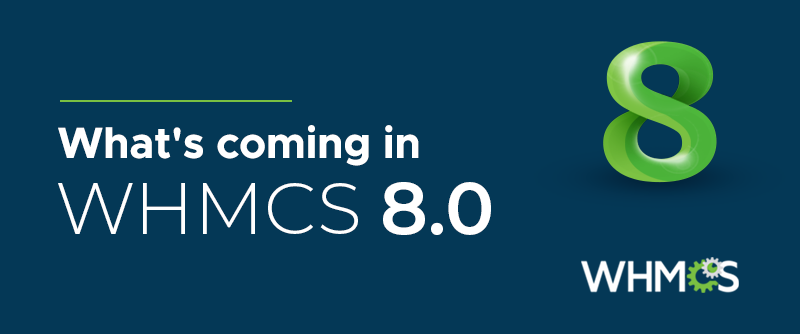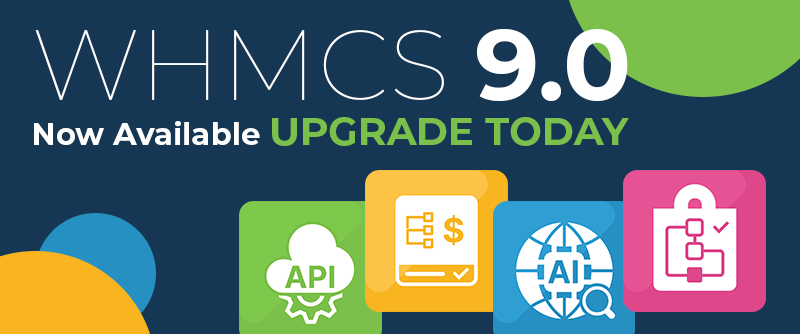
8.0 is right around the corner and yesterday, we sat down (virtually!) with our Founder and CEO Matt Pugh to get the low down on what you can expect in WHMCS 8.0.
Q: We know you have a lot on your plate right now, thank you for finding the time to sit with us and talk about WHMCS 8.0! What can you tell us?
Version 8.0 is going to be the next Major version of WHMCS, and the team is putting the final preparations to it now as we speak.
A major version increment such as this gives us the chance to make more significant behind the scenes changes, as well as undertake major feature work that we've been unable to complete and deliver in shorter release cycles.
And I'm excited about what we're going to be delivering in Version 8.0 - my top 5 are:
1. Shared users for client login and management - this gives people the ability to have a single user account that has access to multiple different client accounts under a single login credential set - this presents a significant shift in the user authentication model for WHMCS and delivers on our most highly requested open feature request today.
2. A refreshed look and feel for the WHMCS admin area, that provides a slimmer, more lightweight and modern experience on desktop, and an improved responsive and touch-friendly experience for mobile and tablet devices.
3. Support for Email Sending Providers such as MailGun, SendGrid and SparkPost for improved email deliverability and reliability, combined with a more robust bulk email tool that enables you to better take advantage of email as a way to drive user engagement with your company.
4. Improved IDN support with added functionality to help enable and simplify IDN sales along with native full support for registration of internationalised domain names with Enom and ResellerClub.
5. Improved support for currencies, with increased limits for the size of numeric values across the product, as well as support for up to 3 decimal places for tax rates.
And we have a few other things in store, so stay tuned.
Q: Can you tell us more about the Shared Users feature?
Yes this is a big one. Authentication and user management is such a fundamental part of any system, so a change like this is a massive undertaking - but one I think we've got right.
To deliver this, we have had to completely re-imagine the relationship between clients and users. Think of clients, soon to be called "accounts" as the entity that owns services, and users, as the human operators that have permission to login and operate on them.
The new functionality will allow one user - one human operator - to have a single login that allows him or her access to switch between and manage multiple client "accounts" seamlessly, creating a much more flexible and powerful solution for the modern web host and managed service provider market.
Q: And what is this about changes being made to the minimum requirements for WHMCS 8.0. Can you tell us more about those?
Yes, Version 8.0 will introduce new minimum requirements - specifically it will require PHP 7.2 as a minimum.
PHP Versions are being released on a more and more frequent basis, and libraries are equally being updated faster and more frequently than ever, often with new minimum requirements.
This creates big challenges for us - as a consumer of many different libraries, protocol abstractions, and APIs, and offering a self hosted software product in which we have no ability to control or influence the environment upon which it is deployed, it's becoming more and more challenging for us to deliver software that doesn't change minimum system requirements more often, because we know that creates difficulties for our users.
With the V7 series, I've been very impressed with what the team has been able to achieve in maintaining backwards compatibility with older versions for so long, but now the time has come for us to raise the minimum requirements to allow us to benefit from many of the more recent developments and changes to PHP and the libraries we utilise.
Most users who are staying up to date and leveraging our latest feature releases are likely to already be set; the trend we see is that PHP 7.2 and 7.3 are very common. You probably will want to double check and go ahead and schedule & perform any PHP updates for your production system before delving into v8.0. Module developers and users with heavy backend customizations will want to take the usual precautions: read the releases notes on each pre-production release. In there, exact library updates and other details will be shared; test your code on each version to ensure you code is upgrade compatible when General Availability arrives.
Q: What have the challenges been with Version 8.0?
Where do I start? (laughs)
From deciding what we work on and prioritise, to minimum deliverables for new features and functionality, to all the user experience and design elements, to working with 3rd party vendors, every stage of the development process has its own set of challenges.
As always, one of the major challenges is time. For the longest time now, we have been committed to delivering 3 feature releases each year. While 3 may not sound like an unachievable amount in a 12 month period, when you factor in development, testing and pre-production timeframes, along with support workload following a release, and how all of that plays into big annual events such as Thanksgiving and Christmas, as well as conferences and other team and personal commitments, the scheduling challenges become a real concern.
The result is that we have very strict windows within which we can target to perform software releases, and therefore have to be very strict about what we do and do not commit to, as missing those deadlines can have significant consequences. But I think what the team has been able to produce in this release cycle has been fantastic.
Q: How does the company decide when it's time for a big release like 8.0?
There are many different factors we have to take into account.
There are outside influences such as changes to the upstream PHP that are always a big factor, as well as adoption rates of those PHP versions among our user base. We wouldn't make a change for example when the majority of our user base would be negatively impacted by it.
Changes in the other libraries and 3rd party code we use and rely on, and how much potential benefit there is, both from a technical and performance standpoint are also another big consideration.
As are the requests we receive from users, and whether those requests require backwards breaking changes.
Perhaps the single biggest factor though is considering what our users want. We hear frequently from users that they find big upgrades to their WHMCS billing platform to be a concern, and so we work very hard to always ensure we're minimising any potential disruption and incompatibilities. It's for that reason we don't make big changes more often, and it's a large part of the reason why today we're still supporting PHP versions which have been EOL for some time.
Q: How does WHMCS 8.0 set the stage for what's ahead?
As I mentioned earlier, Version 8.0 is our opportunity to make big changes behind the scenes, some of which you'll see immediately with the release of 8.0, and some of which you won't.
Regardless, like 7.0 before it, 8.0 gives us a solid, refreshed foundation with new technical possibilities that will enable us to deliver significant and impactful changes, allowing us and the businesses using our product to continue to lead the industry in the coming releases and months ahead.
We have some exciting plans for the V8.0 series.
Q: Do you have an estimate on when we can expect to see 8.0 released?
This is always the question everyone wants to know.
In short, as soon as it's ready. But I know that's not what you were looking for. The longer answer is, it depends... both on what issues we discover during the final stages of development and testing, as well as what else comes up in the normal course of our day to day supporting users and our current product releases.
But rest assured the team is working hard to get it out as soon as possible, and the fact we're talking about it publicly means we're getting pretty close.
Q: Anything else you would like to share with our customers about 8.0?
With the user authentication changes, the WHMCS product becomes much more flexible for both the businesses running it, as well as the customers and businesses that use it, and with the newer PHP versions, you should see some nice performance gains too. Our team is working with ionCube right now to iron out a few remaining issues we've seen in the PHP 7.4 loaders, so we are hopeful that by the time we launch, we'll have full compatibility with PHP 7.4.
The team is also working on messaging and documentation about the underlying technical changes in 8.0 for our developer community which you'll see communicated through blog posts in the coming weeks along with release notes at the point of release.
I'm really excited about what we have coming in WHMCS 8.0 and I think our customers should be too. And you won't have to wait long to get your hands on it!
Thank you Matt for sharing more about WHMCS 8.0! I'm sure our customers will be eagerly awaiting the beta release!


